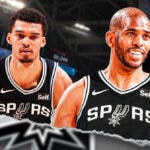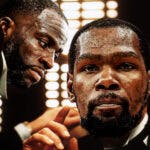A two-game sample size isn't nearly enough to glean meaningful conclusions. As the Golden State Warriors face the prospect of playing Game 3 of the NBA Finals without a hobbled Klay Thompson, though, their struggles against the Toronto Raptors when Steph Curry has been the lone Splash Brother on the floor nevertheless warrant examination.
It's still unclear if Thompson, who pulled his left hamstring while trying to draw a whistle on a three-point attempt in the fourth quarter of Game 2, will play on Wednesday night. Against Golden State's three previous playoff opponents, his potential absence wouldn't loom nearly as large as it does versus the Toronto Raptors.
The Warriors have a 112.1 offensive rating in the playoffs when Curry mans the floor sans Thompson and Kevin Durant, per NBA.com/stats, a hair better than their mark when all three marksmen play together. Golden State has even managed to stay afloat on offense since Durant suffered a calf injury when Curry plays without Thompson, too, scoring 106.3 points per 100 possessions while absolutely dominating defensively.
But the Raptors aren't the Portland Trail Blazers or Los Angeles Clippers, or even the Houston Rockets. They have several different players capable of making Curry and Thompson work both on and off the ball, plus more impactful help defenders – as shot-blockers, charge-takers, and positional rim-protectors – than any of the Warriors' three previous opponents combined.
It shouldn't be surprising that Golden State has a 96.2 offensive rating with Thompson on the bench so far in the Finals. Toronto, as previously mentioned, is loaded defensively, and Nick Nurse's inspired box-and-1 defense following Thompson's injury limited Golden State to 11 points over the final seven minutes and 58 seconds of Game 2. If Andre Iguodala hadn't drained that bold game-clinching three with six seconds left, or, more unlikely, the Raptors hadn't shot 3-of-16 once Thompson went to the bench, the Finals could very well be shifting to Oakland with the defending champions in an 0-2 hole even deeper than it seems given their stroke of health misfortune.
Reminder: The Warriors didn't have “Strength in Numbers” even before Durant, Thompson, and Kevon Looney, out for the series' remainder with a broken collarbone, went down with injury. They willfully sacrificed the justification behind that tired slogan when signing Durant in 2016, confident that a trade-off in star power would raise their ceiling while keeping the floor championship-caliber even if one of their big four went down with injury. But no team plans for the contingency of multiple All-Stars going down in the postseason. It speaks volumes of Golden State's unwavering culture and the singular brilliance of Curry and Draymond Green that their team even has a chance to win Game 3, let alone is favored at Oracle Arena on Wednesday night.
The possible absence of Thompson makes DeMarcus Cousins' rapid reintegration to playoff basketball much more important. He played well in Game 2, especially offensively, taking advantage of the Raptors' aggressive perimeter defense by finding cutters for a handful of easy baskets with pinpoint passes from the post. Still, Cousins' utility as a playmaker is inherently diminished when playing with only one of Curry, Thompson, or Durant on the floor. The off-ball crevices their looming shooting threats create don't materialize at nearly the same frequency when just one of them is playing, and Toronto should feel comfortable letting Cousins go to work one-on-one considering both his lack of conditioning and lift, and the stellar individual post defense of Marc Gasol.
Cousins will undoubtedly create a few easy looks for his teammates by virtue of the Warriors' flow and continuity offensively, and surely carve out enough space in the paint to score a few times of his own. But without Thompson and Durant, he's forced to play more like a primary hub than another cog in Golden State's offensive machine, a development the Raptors should welcome.
As big a rippling issue as Thompson's injury presents in terms of space and pace on one end, there's an argument to be made its impact will be felt just as much on the other. Golden State righted the ship defensively in Game 2 by switching Green onto Kyle Lowry and Thompson onto Kawhi Leonard at intermission, leading to more seamless on-the-fly switching and ensuring one of Green or Andre Iguodala would always serve as a help defender behind the initial point of attack. But without Thompson, and Durant, the Warriors will be forced to stick Iguodala back on Leonard and Green on Pascal Siakam, inevitably curbing the affect of help defense, increasing the likelihood of foul trouble, and further tiring out two players whose games depend a lot on energy and activity.
It's not like Green and Iguodala can play all 48 minutes, either. Leonard's eyes light up when Alfonzo McKinnie is his primary defender, and he should be even more aggressive in that matchup when Cousins, who often lags behind when tasked with making multiple efforts defensively, is manning the middle for Golden State. Quinn Cook and Jonas Jerebko are both imminently exploitable across the floor, and Jordan Bell, active and athletic as he is, is prone to off-ball mistakes that sometimes make him a net negative defensively – especially if he's playing power forward. Shaun Livingston is the only reserve defender Steve Kerr can really count on, and he's much more reliable as a thread of the defensive string than individual stopper at this stage of his career.
Maybe the most overlooked aspect of the Warriors' dynasty is their ability to mitigate the existence of weak spots on defense, then quickly cover them up when the opposition tries to take advantage. The most common example is Curry being put through a ringer of pick-and-rolls, with long-armed hedges, early off-ball rotations, and pre-action switching protecting the two-time MVP from being abused on a consistent basis.
But what happens when it's Cook and Cousins, or McKinnie and Jerebko, in place of Thompson and Looney when Curry is being targeted, or Leonard and Lowry string out out ball screens to stretch the defense? Golden State, at full-strength, is better equipped than any team in basketball to make the rotations necessary to put out those fires. But without three of their top defenders, the Warriors will routinely roll out lineups in Game 3 that pose more questions on defense than answers.
Thompson, remember, hasn't been officially ruled out of Wednesday night's contest. But even if he's active, it goes without saying that he won't be as effective or play as many minutes as he would normally. In a a vacuum, Thompson is probably his team's fourth most important player. With Durant still sidelined and against a talented, multi-faceted opponent like the Raptors, though, his absence or limitations could very well prove the difference between Toronto re-claiming home-court advantage right after they lost it, and Golden State taking complete control of this series en route to an unprecedented fourth title in five seasons.




